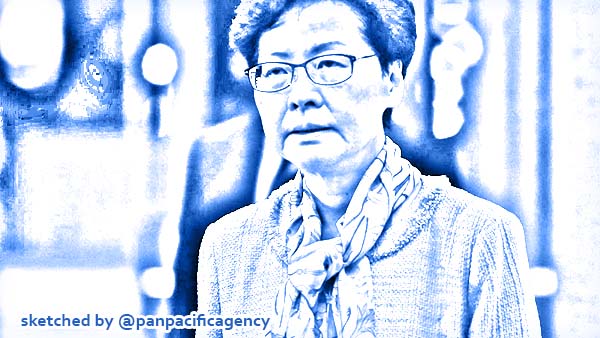Carrie Lam has to hold on while Beijing ponders need for political qualities in Hong Kong’s next leader

Hong Kong leader Carrie Lam has said that a controversial extradition bill, which has spurred weeks of protests in the semi-autonomous Chinese city, "is dead" - but stopped short of a formal withdrawal. (AAP). Sketched by the Pan Pacific Agency.
Will embattled Chief Executive Carrie Lam Cheng Yuet-ngor continue to hang on for the remaining three years of her term? This is the multimillion dollar question that neither Lam nor, perhaps, Beijing has an answer to yet. But when rumours about Lam’s fate swept through Hong Kong last week, Beijing quickly dismissed the notion of any plan to replace her any time soon. Tammy Tam specially for the South China Morning Post.
Political common sense tells there can only be two consequences of such speculation: on the positive side, Beijing’s strong denial signals that Lam is still pretty safe in her job; on a negative note, there is no smoke without fire, and this could well be the trial balloon from whatever anti-Lam group to test Beijing’s bottom line.
But instead of indulging in guessing about possible dark horses, there is a question worth asking: what qualities should Hong Kong’s next leader possess to take this crisis-ridden city forward?
To put it bluntly, does Hong Kong have any well-qualified political talent that deserves local people’s trust as well as Beijing’s endorsement?
Trapped in nearly five months of snowballing social unrest and political turmoil so far, Hong Kong surely needs a strong political leader rather than just a bureaucratic administrator. The unique political structure of the city requires the chief executive to be accountable to Beijing as well as the people of Hong Kong, and that, by default, makes the job political enough.
Ironically, it was Ronnie Chan Chi-chung, the vocal business tycoon, who was bold enough to point out this “Emperor’s new clothes” situation regarding the political nature of the job.
“It’s the most ridiculous thing [for Beijing] to pick a career civil servant as Hong Kong’s chief executive,” he noted.
Agree with Chan or not, his view was echoed by some mainland Chinese intellectuals, including popular internet influencer Ren Yi, who questioned whether the city’s civil service could ever breed real political leaders by sticking to its tradition of requiring officials to maintain political neutrality.
To be fair to Lam, she is indeed a capable bureaucrat. But an eye opener on why that alone may not be enough came during the back and forth with Taiwan over the fate of murder suspect Chan Tong-kai, with her politically shrewder Taiwanese counterparts playing political games in rejecting Hong Kong’s attempts to send him back to the island to face justice.
This also put Lam in an awkward position, with Chan, whose case triggered the extradition bill saga, volunteering to surrender himself to Taiwan, where he is accused of killing his pregnant girlfriend before fleeing home to Hong Kong.
Over the past 22 years, Beijing has tried Tung Chee-hwa, a business tycoon, Donald Tsang Yam-kuen, a civil servant, and Leung Chun-ying, a professional elite, before coming back to a career bureaucrat, Lam, as the city’s leader. The historical and political needs of the time were behind every change.
What and who will be Beijing’s next pick?
This week, all eyes are on the long-awaited fourth plenum of the Communist Party, with modernising China’s governance system and capacity topping the agenda. Resolutions from this plenum may then provide clues to Beijing’s future dealings with the city, a thorny governance issue for the leadership.
Hong Kong has changed profoundly with the ongoing social unrest. Its future leader must have both personal charisma and unconventional political wisdom to build balanced and mutually respectful Hong Kong-mainland relations, and to maintain the city’s international status by correctly navigating its position between Beijing and Western powers, under the “one country, two systems” policy.
Yet the gap between Hong Kong and Beijing is now so wide on whether it is the lack of universal suffrage or talented local leadership – or a combination of both – that has driven the city to the brink.
Where can the right soil be found to groom the political leaders Hong Kong needs? And should civil servants still be on the contenders’ list?
Lam may just have to carry on before Beijing’s difficult decision can be made. A testing moment will be the chief executive’s annual duty report in December to President Xi Jinping.